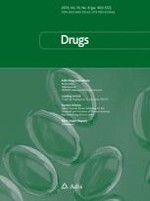Erschienen in:

01.11.2011 | Adis Drug Profile
Pegloticase
In Treatment-Refractory Chronic Gout
verfasst von:
Katherine A. Lyseng-Williamson
Erschienen in:
Drugs
|
Ausgabe 16/2011
Einloggen, um Zugang zu erhalten
Abstract
Intravenous pegloticase offers a novel approach to treating chronic gout refractory to conventional therapy. Pegloticase is a recombinant polyethylene glycol-conjugated form of uricase (a uric acid-specific enzyme lacking in humans) that catalyses the oxidation of uric acid to allantoin.
In randomized, placebo-controlled, double-blind, 6-month, phase III trials, intravenous pegloticase 8 mg every 2 or 4 weeks provided sustained reductions in plasma uric acid levels to less than the therapeutic target of 6 mg/dL in a substantial proportion of patients with chronic gout who were refractory to, or intolerant of, conventional urate-lowering therapy.
Pegloticase 8 mg every 2 weeks was associated with disease-modifying benefits relative to placebo, as shown by significant improvements from baseline in tophi resolution, frequency of gout flares and tender joint count, and clinically relevant and statistically significant improvements from baseline in health-related quality-of-life parameters related to disability, pain and physical function. Pegloticase 8 mg every 4 weeks was also significantly more effective than placebo with regard to most, but not all, of these endpoints.
Preliminary data from an open-label extension of the phase III trials indicate that long-term treatment with pegloticase 8 mg every 2 or 4 weeks may maintain plasma uric acid normalization in patients who experienced a sustained uric acid response during the phase III trials.
The most common serious adverse events associated with pegloticase are gout flares, infusion reactions and anaphylaxis. In addition, exacerbation of pre-existing congestive heart failure was reported in 2% of patients receiving pegloticase 8 mg every 2 weeks in the phase III trials.